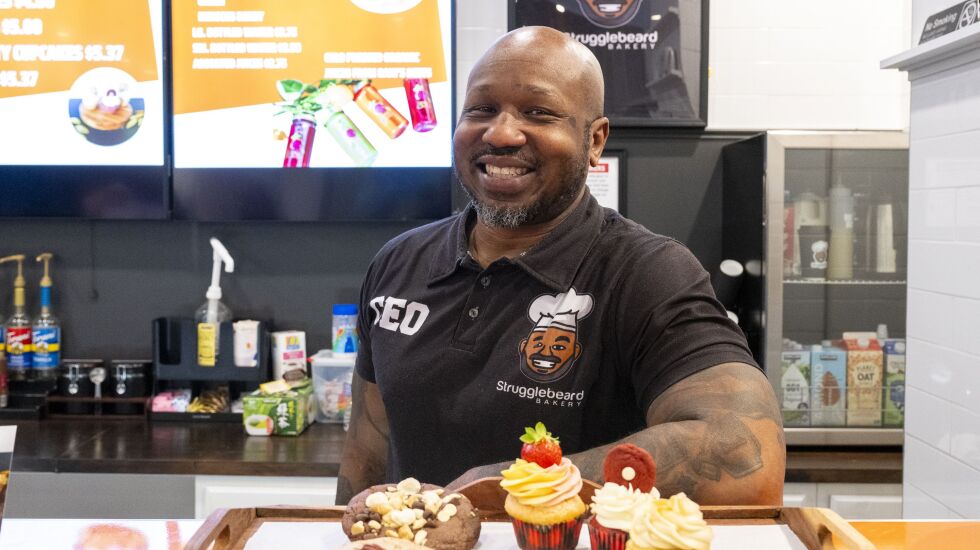
During the pandemic, Quinton McNair was pursuing two goals: Grow out his beard and perfect his baking skills.
“The beard was struggling,” said McNair, 47, a recently retired Army veteran who lives in Matteson.
“The cookies were struggling. I was struggling with depression and PTSD [post-traumatic stress disorder].”
But he slowly improved his craft, which not only became “therapy” but also drew a growing customer base that eventually allowed him to open Strugglebeard Bakery in Hyde Park’s Harper Court in October.
Still, the struggle continued — especially as he brought on employees.
“That first payroll rolled around, and it was actually more than my rent,” he said.
Fortunately, McNair was able to forge ahead with a grant from the Black Kitchen Initiative, which awarded $1 million in total to 62 Black food business owners this year.
Struggledbeard Bakery is one of three Chicago restaurants that received support from the project, which is overseen by the Kentucky-based LEE Initiative nonprofit, the Heinz company and the Southern Restaurants for Racial Justice (SRRJ) coalition.
Entrepreneurs such as McNair received $15,000, while legacy businesses operating for at least 20 years received $25,000.
“I’ve been dipping into my retirement and disability check every month to help pay for things for the bakery,” McNair said. “That grant allowed me the freedom to actually operate.”
The partners behind the Black Kitchen Initiative noticed the disparities faced by Black-owned restaurants during the pandemic, as reports showed they were receiving Paycheck Protection Program (PPP) loans at lower rates than other groups, said Lindsey Ofcacek, co-founder, managing director and mentor with The LEE Initiative.
And funding is still a challenge today, with 37% of Black small business owners struggling to access new capital and financing—14 percentage points higher than non-Black entrepreneurs, according to a 2023 Goldman Sachs 10,000 Small Businesses Voices report.
Since its inception in 2021, the Black Kitchen Initiative has awarded $3 million to grantees who submitted applications.
Ofcacek said the project is part of the work the LEE Initiative does to “ensure that the restaurant industry is kinder and more sustainable, and a better place to be.”
“We try to fill those gaps,” she added. “The Black culinary voice is so important, especially to cuisine in this country.”

For his part, McNair is contributing whimsical treats, everything from strawberry lemonade cupcakes to cookies such as the Dr. GQue Rocky Road, named for family and friends.
“I enjoy people enjoying stuff that I make with my own hands,” he said.
Demystifying West African cuisine
While McNair mastered his technique through a lot of “trial and error,” Chef Chiedoziem “Dozzy” Ibekwe learned how to cook West African cuisine from his mother and grandmother while growing up in Aba, Nigeria.
“We made everything from scratch,” said Ibekwe, 43, of the South Side, who received his second $15,000 grant from the Black Kitchen Initiative this year. “We had a garden in front of our house.”
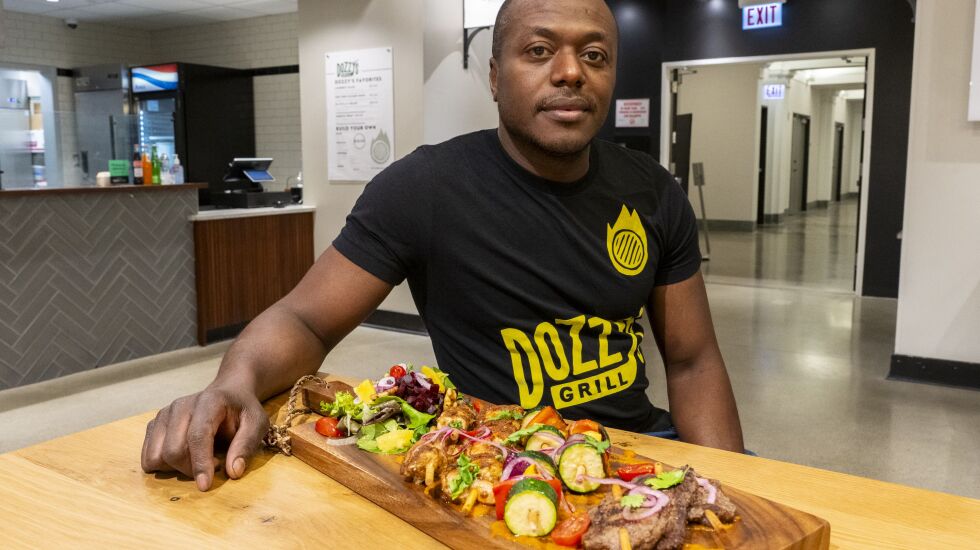
Ibekwe immigrated to the United States at age 14 and went on to study hospitality at Roosevelt University. He worked in restaurants and as a concierge for several hotels, including the Warwick Allerton-Chicago, formerly Allerton Crowne Plaza Hotel; the Kinzie Hotel, formerly Amalfi Hotel; The Ritz-Carlton; and others.
“I’ve helped people make millions,” Ibekwe said. “I’ve helped some restaurants get successful. There’s no reason why I shouldn’t be able to do it myself.”
He launched Dozzy’s Grill — specializing in West African fare — in a ghost kitchen in 2020, but had to shut down several months later.
“I had no online real estate,” he said. “I had no visibility. I didn’t quite see the volume that I needed to maintain my occupancy and prime costs.”
Ibekwe reopened in 2021, paid off some debt and sustained a six-month residency at Retreat At Currency Exchange Café on the South Side, with the first grant.
Today, he is in Crockett Cookies Food Venue in the Illinois Medical District, but hopes to have his own space.
He said receiving the funding from the Black Kitchen Initiative was “like Christmas.”
“Occupancy costs are pretty high,” he said. “Access to loans or financing can be challenging … I’ve been working hard on the business so we can do our work.”
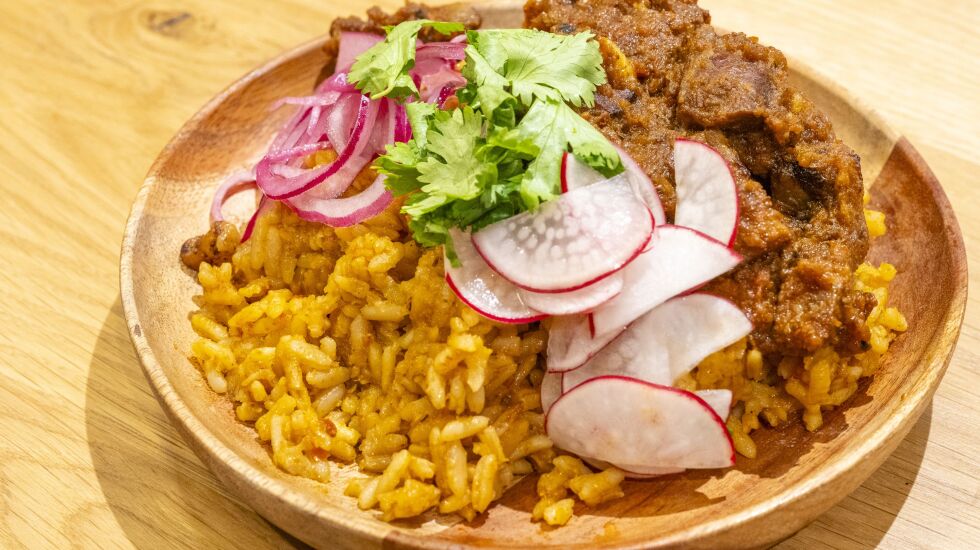
That work includes providing excellent customer service and creating dishes such as chicken, beef and shrimp suya, or meat skewers; Da G.O.A.T. Jollof, or long-grain rice in tomato sauce with boneless stewed goat shoulder; and Afrobeet Salad, featuring organic red beets, cherry tomatoes, red onions, orange, fennel and toasted walnuts in orange paprika vinaigrette.
“It’s knowing how to showcase a cuisine, making it relatable, approachable,” Ibekwe said of his menu. “It helps when it’s affordable. That’s some of what we do at Dozzy’s Grill to help demystify West African cuisine.”
Soul food with Creole flair
The average American diner is certainly more familiar with soul food, which is offered with Creole influences by Cleo’s Southern Cuisine, another $15,000 grant recipient.
“I was speechless, really,” owner Kristen Ashley Harper, 34, of Bronzeville, said of receiving the money, which will help her move her flagship Bronzeville restaurant to a bigger location a few blocks away early next year. Harper also has a location in the Loop, and just signed a lease for a space in a ghost kitchen in Avondale.
She said she also plans to use the grant to provide her staff with Christmas bonuses.
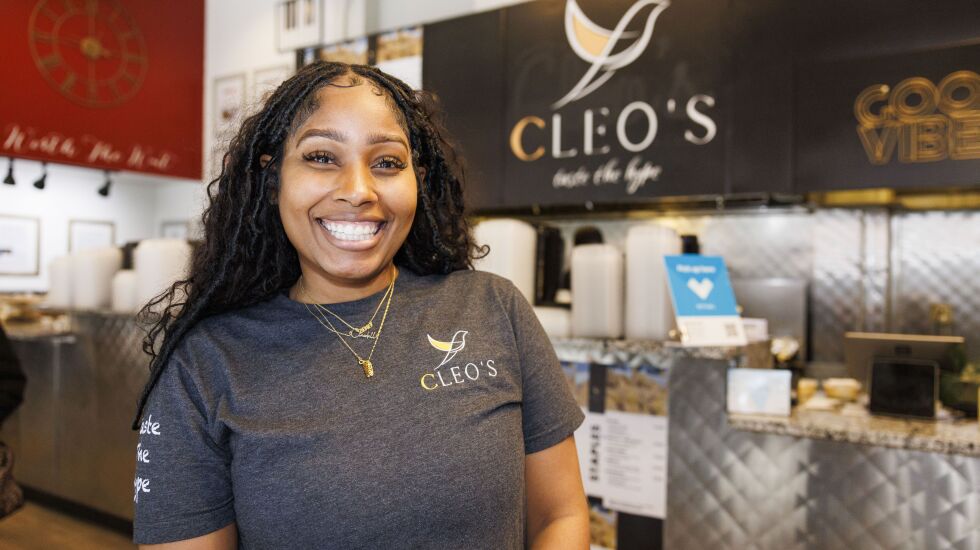
Harper’s signature dishes include chicken and waffles, the Hot Honey Chicken Sandwich and The Fly Over, which features Creole-friend catfish filets and chicken wings topped with Creole-butter lump crab and house-made remoulade sauce.
“Those are the three things that people just fall in love with,” she said.
She also created a 24-Karat Gold Butter Sauce that covers her signature muffins, and can be ordered on the side.
Cleo’s visibility is rapidly growing. This year, the restaurant received a visit from popular TikTok food critic Keith Lee, and was featured in a Google ad for Black-owned businesses starring actress Keke Palmer.
“It has just been insane,” Harper said. “Tickets just pouring off the table, the lobby packed, the phones ring at both locations. It has just been amazing.”
Prior to opening her first restaurant in 2019, the former college basketball player was a sports journalist.
But she decided to pivot and pay homage to her late grandmother, Cleo, of Mississippi, who cooked soul food dishes.
“Everything that I do or everything that I make, it’s always like she’s working through me,” Harper said.
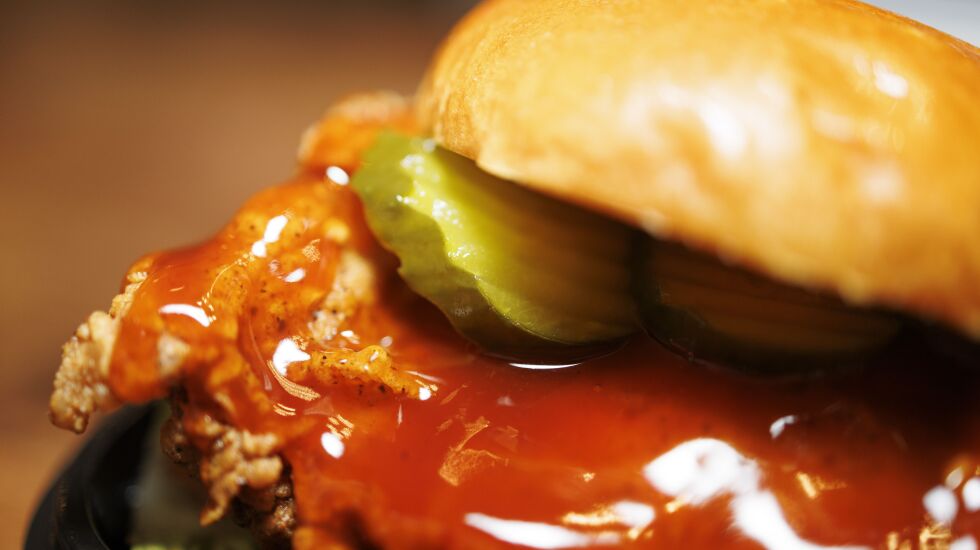
Reflecting on those early days, Harper said getting initial financing was not easy.
“I went to different banks, and they were not willing to take a chance on a young Black girl,” she said.
“It’s hard for Black and brown people to get traditional loans or any kind of help from these big banks. So, these organizations like The LEE Initiative — when they partner with a brand as big as Heinz, it gives some kind of peace of mind that, OK, somebody’s paying attention, somebody understands we need a little bit of help. We don’t need a handout; we just need a little bit of help.”







